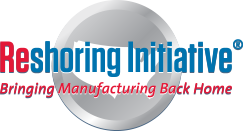Sea Trains: The Future of Maritime Supply Chains
Reshoring Manufacturing To Revive American Industrial Base and Maritime Capabilities
President Donald Trump's announcement of the creation of a shipbuilding office in the White House marks a significant step towards revitalizing the American shipbuilding industry. He emphasized the importance of bolstering the defense industrial base by resurrecting the American shipbuilding industry, which includes both commercial and military shipbuilding.
The challenges facing the shipbuilding industry—such as reshoring the manufacturing base, retooling a skilled workforce, and addressing global supply chain constraints—will require concerted efforts and strategic planning to secure the future of American shipbuilding.
Reshoring Initiative
Reshoring is the practice of bringing manufacturing and services back to the U.S. from overseas. As a fast and efficient way to strengthen the U.S. economy, reshoring helps balance the trade and budget deficits, reduces unemployment by creating good, well-paying manufacturing jobs, and fosters a skilled workforce. The Reshoring Initiative is focused on helping companies shift collective thinking from “offshoring is cheaper” to “local reduces the total cost of ownership.”While the United States has not been a significant player in commercial shipbuilding for decades, concern has grown in Washington that its declining maritime industrial base puts it on the back foot in competing with China’s rapidly growing economic and military power. Reviving the U.S. shipbuilding industry is essential for maintaining national security, economic stability, and global influence.
New-Collar Workforce
The United States is discovering that the demise of vocational education and shop classes at the high school level has bred a skills shortage of career and workforce-ready graduates. While some of the new-collar jobs require a college education, most are "middle skill" jobs requiring a high school diploma, a foundation of math and science, along with some additional training acquired through apprenticeship and/or credentialing programs.
As advanced manufacturing jobs are reshored, demand for skilled workers has grown as new factories need to be built, robots programmed, new infrastructure developed, and the talent pipeline replenished with a skilled career-ready workforce. Over the years, the dividing line between blue and white-collar workers has grown frayed, and it is about time to move to a new-collar worker philosophy where essential skills matter more than outdated degrees.
The President and CEO of The Reshoring Initiative®, Harry Moser is dedicated to educating manufacturers on the importance of manufacturing to the U.S. “The government needs to take some real action to push funds into training programs instead of university loans,” said Moser.
Career Technical Education (CTE) is needed as an educational strategy to equip learners with the academic and technical skills they need to be prepared for future careers. The new-collar workers that manufacturers seek need to have the digital skills to “run automation and software, design in CAD, program sensors, maintain robots, repair 3D printers and collect and analyze data,” according to Sara Boisvert, author of The New-Collar Workforce. The Importance of Shipbuilding Liberty ships (LS), named by President Franklin D. Roosevelt to bring "liberty" back to Europe. Give me Liberty or give me death!” a rallying cry of the Revolutionary War, got a second act in World War II. This time the call was more like, “Give me Liberty ships, and make it quick!” as the country was desperate to build up its outdated flotilla of cargo ships and devastated naval fleet. LS needed to design and build on a mass-production scale to resupply Europe and its troops with the supplies needed to win World War II; Liberty ships came to symbolize U.S. wartime industrial output and resilience. The design and construction of WWII Liberty cargo ships revolutionized shipbuilding by overhauling the blueprint process and standardizing on commonality of parts, welding, pre-fabrication, and assembly line construction. Over time, the Liberty ships were deemed too slow and small, leading to the development of a new line of ships called Victory ships. Sea Trains: Revolutionizing Maritime Transportation Sea Trains (ST) represent the next evolution in maritime transportation, aiming to achieve lower manufacturing and transportation costs with reduced fuel emissions. Inspired by high-powered railroad locomotives, the concept of ST will utilize a large number of sea barges (replacing railroad cars) powered by nuclear energy to travel long distances over water more quickly. This innovative approach allows for the flexibility of dispatching barges to multiple destinations, similar to train depots, making it an economically feasible and environmentally friendly alternative to conventional large container ship methods. This first phase of ST can be powered by traditional locomotive power sources and then be converted to nuclear power. The implementation of Sea Trains also addresses the growing demand for shipbuilding capacity. Sea train barges can be produced by repurposing existing locomotive facilities to Sea Train production, along with the retooling of traditional barge manufacturers This repurposing frees up much-needed shipbuilding capacity, allowing shipyards to focus on producing defense warships, submarines, and carriers, which are critical for national security. Conclusion President Donald Trump's vision of reshoring manufacturing and reviving the maritime industrial base holds great promise for America's future. By investing in new collar professionals and innovative transportation solutions like Sea Trains, the United States can strengthen its economy, create high-quality jobs, and maintain its strategic advantage on the global stage.- - -
Glenn Marshall, Newport News Shipbuilding (retired), is on the Association for Manufacturing Excellence (AME) Southeastern Regional Board, leads a “Manufacturing and Educational Renaissance,” and is a member of the Reshoring Initiative. For more information, contact marsh8279@aol.com.
- - -

